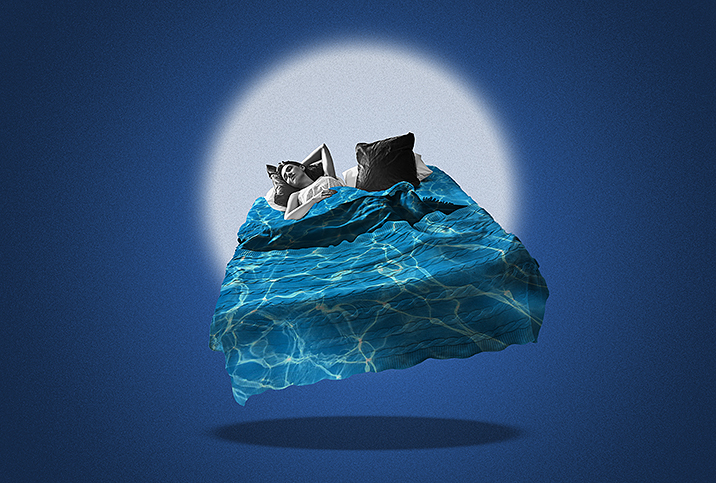Wet Dreams Aren't Just During Puberty

After a frustrating 12 months of lockdown, no sex and extremely sporadic jerk-off sessions, a 34-year-old guy sheepishly took to Reddit with a simple inquiry. "Kinda embarrassing to ask," he said, "but [do] any other adult guys have occasional wet dreams still?"
It's perhaps inevitable given the ongoing lack of sex education across the U.S., but it seems there's still a myth that wet dreams only happen during puberty. From concerned letters to sex advice columnists about the "normality" of their partner's wet dreams to anonymous forum posts anxiously checking if it's okay to still wake up in cum at the age of 21, there's a nervousness around wet dreams rooted in a lack of understanding.
Cultural attitudes don't help this anxiety, either. Reddit threads are packed full of humiliating wet dream stories, which range from shame about the content of the dreams—one guy fantasized about sex with his sister in the 69 position, another simply summarized: "Dreamt I was fucking a chicken. Yeah, not my proudest moment"—to embarrassment about ejaculation, such as the poor guy who woke up in a wet patch while he shared a sleeping bag with a friend on a Boy Scout camping trip. On the other end of the spectrum are horny explorers, who dedicate their time to learning "lucid dreaming" techniques to achieve nocturnal orgasm.
Wet dreams don't have to be a punchline or a cause for concern. Known scientifically as nocturnal emissions, wet dreams can regularly rear their head post-puberty, especially if you're not sexually active.
Whether you have a penis or a vagina, the likelihood is that you'll occasionally wake up wet throughout adulthood. Vaginas naturally lubricate throughout the night as the clitoris engorges during sleep, but arousing dreams can amp up this wetness or push you to orgasm. Similarly, the average penis will stiffen a few times throughout the night, but it's during the deepest REM period of the sleep cycle that an erection is more likely to result in orgasm.
These wet dreams look different for everyone. If you have a penis, you'll likely wake up in a sticky, wet patch; if you have a vagina, you might not notice anything at all.
"With men, there's a noticeable aftereffect," explained Corey Babb, D.O., a Missouri-based gynecologist, alluding to the actual ejaculation. "With women, vaginal secretions vary throughout the night, based on body temperature, menstrual cycle and other factors. If a woman is around ovulation, they're going to have a lot more vaginal discharge anyway, so there may not be the same noticeable effect."
Because puberty is a chaotic roller coaster of hormonal shifts, wet dreams are disproportionately common during this period of sexual maturation. "The body experiences rapid physical and emotional changes during puberty, with young men producing increasing levels of testosterone," said Vaibhav Modgil, M.S., speaking on behalf of the Urology Foundation. "This results in sperm production, genital growth and increased facial and pubic hair. It's classically around this time boys experience 'wet dreams,' which are entirely normal."
This surge in testosterone is the biggest factor at play, but Babb pointed out that this sex hormone isn't unique to cisgender male bodies. "We know testosterone plays a huge role in sexual desire and functioning, regardless of biological sex," he said. Although women generally have much lower levels of testosterone than men, young girls also see sharp hormonal swings during puberty, meaning that wet dreams aren't just a teen boy phenomenon. "The first two years after a woman goes through puberty, her menstrual cycles can be all over the place because of these hormonal fluctuations happening in spikes and surges, as opposed to the peaks and valleys we see in later life," he continued.
There's a whole host of other demographics more likely to experience wet dreams after puberty, too. Pregnancy induces a surge of maternal testosterone. According to a 2017 study published by the European Journal of Endocrinology, factors such as weight and age determine the extent of this increase. Hormone replacement therapies are another obvious cause, with trans men taking testosterone as part of their medical transition and postmenopausal, cisgender women commonly prescribed testosterone to tackle low libido.
For some, nocturnal orgasms might sound like a dream come true, but others will see them as a medical concern. In Babb's experience, not everyone is comfortable talking openly about sex with medical practitioners. "There's this history of describing female sexuality as 'hysterical,' which is fascinating from an intellectual standpoint but has obviously set us back quite a bit in terms of actually looking after people," he explained. "Especially in religious areas, there's this idea that wet dreams are a sign of impurity, but there are things happening hormonally that are outside of your control."
For those with penises and without, wet dreams are nothing to be ashamed of, no matter your age. They're not a sign of sexual dysfunction—if anything, the opposite. "You'll find that some people have wet dreams throughout their whole life, especially if they're going between periods of not ejaculating," Babb concluded. "From a physiological standpoint, [wet dreams] are the body's way of letting you know that your machine is working."


















